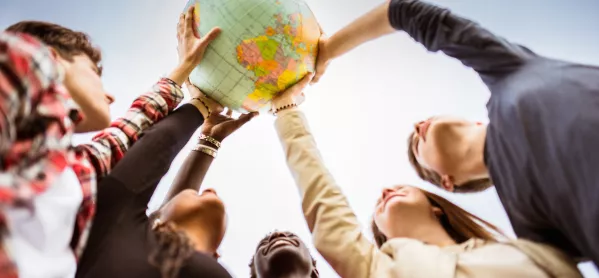I’ve always thought of myself as a global citizen. Growing up as an ethnic minority in Britain, I was acutely aware of how I was “different”.
I was brought up in a bilingual family, able to read and write in a language other than English from an early age and always taught to value my cultural differences. However, I was never confident in shouting out about it; instead, it felt as if it held me back.
I didn’t go to dance clubs or the school discos because it wasn’t culturally acceptable. In my teens, there was no partying, no drinking, no boys. I stopped wearing henna on my hands for special occasions because other kids said it was ugly. When a young person feels they have to hide their cultural identity, that’s not a weakness on their part - it’s a weakness in society.
More by Uthmani: ‘How do we ensure fair grades for BAME students?’
Citizenship: ‘It shouldn’t be a subject, it should be lived and practised’
Teaching true citizenship: How should we teach students about climate change?
But I don’t want you to think I had a miserable childhood - absolutely not. I was the biggest fan of Bollywood and would look forward to our family movie weekends when dad rented out VHS tapes of the latest hits. I spent hours choreographing my own dance routines and I have so many happy memories of sharing those experiences with my friends in our family’s cultural bubbles. So, I was happy in my ethnic world. And in the other world, out there, I had good friends who understood me.
Once I became a teacher, I felt I could teach future generations about the value of cultural identity and heritage. I’ve grown in confidence over the years to be able to value my own identity and promote the benefits of multiculturalism.
So, when I was offered the opportunity through my school to enrol on a global citizenship certification with an organisation called WOSDEC (West of Scotland Development Education Centre) last year, I thought this would be ideal. In completing a baseline teacher survey, I ranked myself quite highly on questions such as understanding of global citizenship and my ability to deliver it in the classroom.
I am happy to admit I was wrong. It became quickly apparent that global citizenship was about much more than ethnicities and identities. More poignantly, coming from an ethnic minority myself was no guarantee of having the upper hand in understanding global citizenship - understanding cultures and ethnicities is a big part of it, but there is so much more.
We need to think about how we encourage learners to think about the impact of their actions, not only on their local communities but the further global impact. Another key aspect is the ability to challenge pre-existing stereotypes. Sometimes, subconscious biases exist within children as well as in adults.
Although the UN Convention on the Rights of a Child was established more than 50 years ago, we sadly still live in a world where some people are often viewed as inferior to others. In Britain, we regularly see images of poor children, often all brown-skinned from poorer countries. Our learners need to be taught to analyse such images and consider how people in this country face similar issues, and compare how different societies are tackling them. Challenging these images is vital - do you really think every person in that country is that poor? Does that really make sense? What examples are there in our local environment of deprivation?
There is always more to learn, and we need to encourage our learners to be genuine critical thinkers. And I want to be a teacher who embeds global citizenship in all aspects of the curriculum, instead of just holding themed weeks.
As we embark on a “new normal” after Covid-19, we should reflect that the pandemic has shown how closely the citizens of the world are inter-connected. We have also seen the different challenges faced by the richest and poorest in society, and the impact on the environment of a reduction in carbon emissions.
If I am successful with global citizenship education, my pupils will truly be able to think, analyse and reflect - and we really need that just now.
Nuzhat Uthmani is a primary teacher and trade union representative in Scotland





